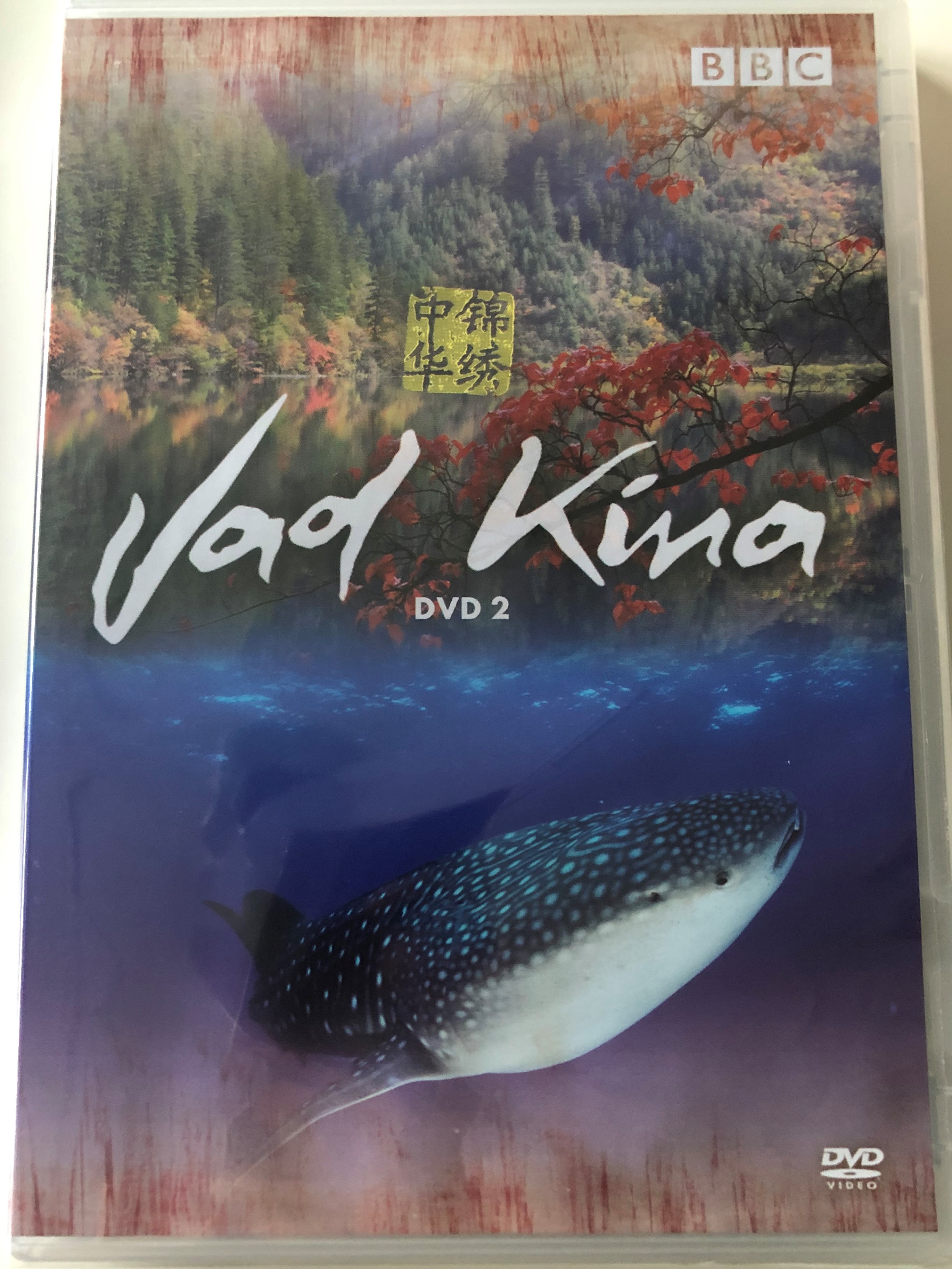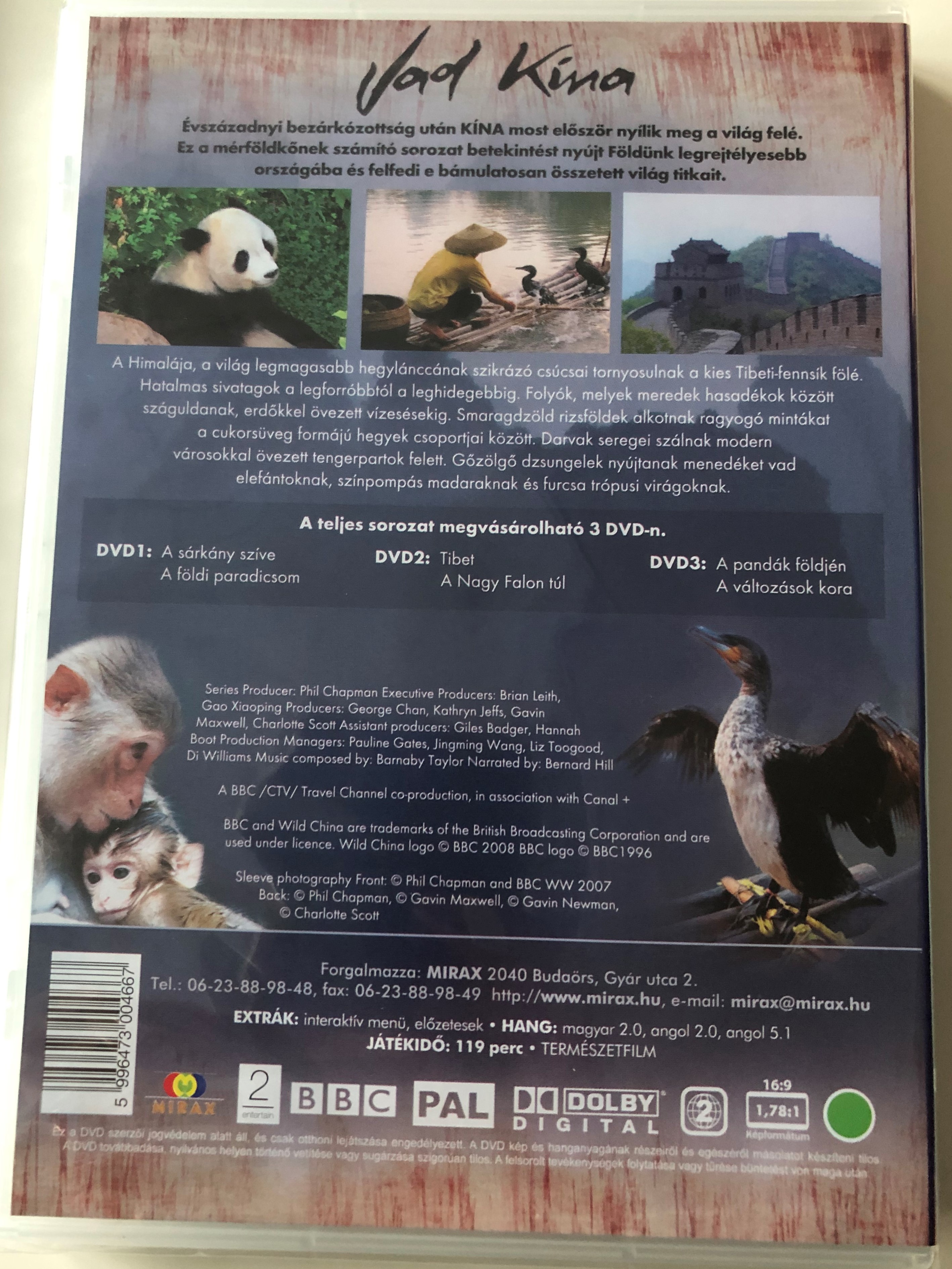Description
Wild China 2. DVD 2008 Vad Kína 2. DVD / BBC Nature Documentary Series / Narrated by Bernard Hill, David Suzuki / Executive producer: Brian Leith
UPC 5996473004667
MADE IN HUNGARY
REGION 2 PAL DVD
AUDIO: English 2.0, English 5.1, Hungarian 2.0
Total Runtime: 119 minutes
English Summary:
Wild China is a six-part nature documentary series on the natural history of China, co-produced by the BBC Natural History Unit and China Central Television (CCTV) and filmed in high-definition (HD). It was screened in the UK on BBC Two from 11 May to 5 June 2008. The English narration was provided by Bernard Hill and the series produced by Phil Chapman for the BBC and Gao Xiaoping for CCTV. The Chinese version was broadcast under the title Beautiful China. In Canada, it was broadcast on CBC as part of the series The Nature Of Things narrated by David Suzuki. Wild China was broadcast in Australia on ABC1 and ABC HD each Sunday at 7:30pm from 18 May 2008.
The musical score to accompany the series was composed by Barnaby Taylor and was performed by Cheng Yu and the UK Chinese Ensemble.
The series was billed as the culmination of the BBC Natural History Unit's "Continents" programmes, a long-running strand of blue-chip wildlife documentaries which surveyed the natural history of each of the world's major land areas. It was preceded by Wild Caribbean in 2007, but with the broadcast of South Pacific in 2009 the BBC signalled a continuation of the strand.
Episodes on DISCS:
DISC 2
3"Tibet"
The Tibetan Plateau is the subject of the third installment. It covers one quarter of China’s land area, but just 2.5 million people live there, the majority Tibetan Buddhists. Their religion mixes traditional Buddhism with older shamanic beliefs, and its teachings have instilled a respectful attitude to wildlife. Rare species such as black-necked cranes and Tibetan eared pheasants can benefit directly from co-existence with people. Meltwaters from Tibet’s 35,000 glaciers form large freshwater lakes including Qinghai and Manasarovar. Nesting birds here include great crested grebes and bar-headed geese. The plateau is a high altitude desert swept by freezing winds, but is also home to China’s biggest concentration of large animals. Argali sheep are seen descending hillsides to their winter grazing sites. In the Changtang, chiru are filmed congregating in the rutting season, and wild yaks are only found in the remotest areas. Predators include the elusive snow leopard and the Tibetan fox, filmed profiting from a Tibetan bear’s attempts to hunt pika. A highly lucrative "caterpillar fungus" (yatsa gunbu) is harvested from the spring ground for use as a traditional remedy. Life even clings on in the most extreme environments; the slopes of Everest are home to a species of jumping spider, whilst the unique hot spring snake survives at 4,500m by warming its body in thermal springs. The Saga Dawa festival takes place at sacred Mount Kailash and draws pilgrims of many faiths. Tibet is a fragile ecosystem; its glaciers are melting, and this will have a profound effect on the future for billions of people who depend on waters flowing from the plateau.[17]
4"Beyond the Great Wall"
The fourth episode looks at the lands north of China’s Great Wall. Here, nomadic tribes from a variety of ethnic groups still roam, but their traditional ways of life are changing as people move to modern cities. In ancient Manchuria, the last Hezhe fishermen still cast their nets beneath the thick ice of the frozen Black Dragon River. The forests here support wild boar, which forage for walnuts in winter, and the last remaining wild Siberian tigers in China. Ewenki reindeer herders came from Siberia hundreds of years ago: now, only 30 remain. Further west lie the rolling Mongolian steppe grasslands, and at Bayan Bulak, the livestock of Mongolian horsemen share the pastures and wetlands with breeding demoiselle cranes and whooper swans. Continuing westwards, the land becomes increasingly hot and dry, turning first to arid grasslands roamed by rare goitered gazelles, and then to the Taklamakan Desert, the world’s largest shifting sand desert. Here stand ruined towns, a legacy of the Silk Road, and many yardangs, sand-sculpted rock formations. Underground irrigation canals at the Turpan oasis enable grapes to be cultivated, and red-tailed gerbils are quick to take advantage. Kazakh nomads spend the summer in the Tian Shan before descending to the Junggar Basin, an arid land bordering the Gobi Desert, to overwinter. Here their livestock shares the meagre pasture with the last wild horses on earth. A Kazakh demonstrates the 6000-year-old tradition of hunting with golden eagles. The closing scenes show the Harbin Ice Festival.
Hungarian Summary:
Évszázadnyi bezárkózottság után, Kína most először nyílik meg a világ felé. Ez a mérföldkőnek számító sorozat betekintést nyújt Földünk legrejtélyesebb országába, és felfedi e bámulatosan összetett világ titkait. A Himalája szikrázó csúcsai – a világ legmagasabb hegylánca – tornyosulnak a kies, Tibeti fennsík fölé. Hatalmas sivatagok a legforróbbtól a leghidegebbig. Folyók, melyek meredek hasadékok között száguldanak, erdőkkel övezett vízesésekig. Smaragdzöld rizsföldek alkotnak ragyogó mintákat a cukorsüveg formájú hegyek csoportjai között. Darvak seregei szállnak modern városokkal övezett tengerpartok felett. Gőzölgő dzsungelek nyújtanak menedéket vad elefántoknak, színpompás madaraknak és furcsa trópusi virágoknak. Jöjjön velünk egy elképesztő utazásra lélegzetelállító tájakon át, a Himalája csúcsaitól a kopár sztyeppékig, a sark közeli fagyoktól a trópusi szigetekig! Nagy felbontású kamerák rögzítették a titokzatos és csodálatos, vad és ritka lényeket, valamint a legkülönbözőbb társadalmi formákban élő népcsoportok életét.
A sorozatból megismerhetjük számos elképesztő és elkápráztató, ritka és gyönyörű teremtményét Kínának, ami a Himalája fehérlő csúcsaitól forró és jéghideg sivatagon át, forró és fülledt dzsungelig mindent felvonultat, ami csak földrajzilag lehetséges.
EPIZÓDOK:
DVD 2 :
Tibet
A Nagy Falon túl
| Also known as | Beautiful China (Chinese title) |
|---|---|
| Genre | Nature documentary |
| Narrated by | Bernard Hill (BBC) David Suzuki (CBC) |
| Composer(s) | Barnaby Taylor |
| Country of origin | United Kingdom/China |
| Original language(s) | English/Chinese |
| No. of episodes | 6 |
| Production | |
| Executive producer(s) | Brian Leith |
| Producer(s) | Phil Chapman (BBC) Gao Xiaoping (CCTV) |
| Production location(s) | China |
| Running time | 384 minutes |
| Production company(s) | BBC Natural History Unit CCTV |
| Release | |
| Original network | BBC Two |
| Picture format | SD: 576i HD: 1080i |
| Audio format | SD: Stereophonic HD: Dolby Digital 5.1 |
| Original release | 11 May – 15 June 2008 |























